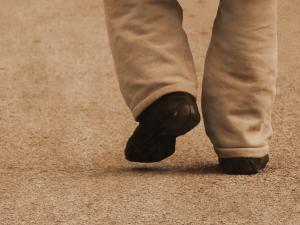I am David, and I am an autistic, bisexual, Christian minister. A few months ago, that combination of words would never have passed through my mind. Writing them has been like scales falling from my eyes.
Growing up
I was diagnosed with ADD (attention deficit disorder) when I was in kindergarten and struggled in school through my elementary school years both socially and academically. They tried every drug in the book on me, but none worked.
My mother, a church youth worker, was often stressed by my tendency as a youth to stay in the van and watch Star Trek during youth camping trips or wear headphones. Looking at it from this point, the signs of autism were there, we just did not see them.
High school was rough in the mean-spirited world of trying to pretend you know who you are in a world where no one really knows who they are. In my teen years I expressed an interest in politics and theology, which led me into some dark places in Christian fundamentalism. Protesting at abortion clinics provided a community for me to vent my anger at my parents’ divorce and a community – though it was very misdirected. My burgeoning sexuality was increasing as well, which added to a deep, repressed shame.
With the help and mentorship of several loving people from the church and community, I was able to turn my life around by the time I graduated high school.
Early adulthood
My first few jobs were interesting. I found as a junior in high school working at Burger King taking orders with four people standing in line was not for me. The pressure of those people standing there in line waiting for ‘fast food’ while at the same time learning the keys on that computer pad was overwhelming.
I developed a love for radio broadcasting and journalism. I took a course in broadcasting and landed a job as a radio broadcast journalist in a small market almost right out of high school. It was an amazing experience. There I could close the door to the little newsroom (for the most part), do my own interviews, ask questions, write stories, and assemble newscasts. It seemed ironic to me then that I failed a Burger King but succeeded at broadcast journalism. It makes perfect sense now.
After that job, I became a program director at a rural radio station in southeast Minnesota. I did well there but didn’t enjoy that as much as reporting the news. I had a tumultuous first marriage and welcomed my first child, a girl, into the world during that time. God’s calling to ministry never left my life, and throughout that period I continued to do online and night school, eventually earning my bachelor’s degree from a small Bible College.
I excelled in college studies. I developed a mind through journalism work that was far more inquisitive, and more theologically progressive than the Bible College I attended. If I had a well-rounded syllabus and clear expectations from my professors, I was always confident I could excel in the academic world.
Ministry and Seminary
I was called into ministry. There was no shaking it. I was moving on from radio broadcasting to church work. I had started the process to become a minister in the United Methodist Church. For me, the United Methodist Church, at least at the time, held on to some of the Evangelical roots I appreciated but was still open-minded enough to reflect on hard questions.
I fell in love with the United Methodist Church. I loved the theology. I found its founder, John Wesley, to be a somewhat neurotic character, but enjoyed his later sermons, Armenian theology, and modern process theology. I was given a little church to lead in a rural setting. Overall, it went well, but I struggled with the United Methodist licensing and ordination process.
For those who are not aware, the United Methodist Church is a bureaucracy. I say that not in a mean-spirited way. It simply is. It is a very top down, top heavy system where all churches and conferences are governed by a Book of Discipline. As a nearly 4.0 GPA student, I struggled to understand why I struggled so much in the interview processes in the church.
The denomination asked me to attend one of their seminaries. By that time, I was remarried, and my spouse reluctantly agreed to make the investment. I loved seminary and once again thrived in that environment. Still, I struggled in the denominational interviews. When I graduated, I was appointed to two more rural congregations.
Long story short, it was now past 2016 and I had the heart of a prophet – and it didn’t go well. I was growing discontent with hiding my own sexuality but was deeply in love with my wife. I confided in a few other clergy mentors. Then the dysfunctional ‘special’ 2019 United Methodist General Conference happened where the church spewed hateful words at each other over the topic of human sexuality. I felt deeply hurt by my own church, adding to the resentment for poor ordination interviews I had. Soon after, I came out to my wife, and she graciously held my hand and accepted me as I came out through my tears.
I would later find that problem with the ordination process was that it was not the same as writing a paper or putting together a newscast. It triggered the same autistic anxious feelings as the Burger King or youth group campfire experience. I was in a room with 6-10 people with unclear expectations. A very overwhelming place, even for a person with high-functioning autism.
Crash and burn
My sermons were usually well received (unless I felt called to give a challenging or prophetic message). I believed in my public speaking skills to do very good funerals and address the public at various occasions as a public theologian. I would receive various compliments for the visits I would do and the words I would share.
Ironically, that was the awkward part. Brunch after church or funeral dinners were the most difficult for me. I would find that I would run out of topics to talk about or things to say. I would easily forget names, leaving people feeling as if I didn’t care. I accepted a position at a UCC (United Church of Christ) congregation to find that, a few months in, they would report to me that my interactions were ‘awkward’ with the congregation and that I was ‘difficult to talk to.’ Worst of all, I was receiving complaints that I was making people feel ‘excluded’ or ‘ignored.’ This was completely antithetical to the core of my theology, and at the time, I took these comments as pure sabotage.
Only ten months into the job, the council would ask me to leave. Both my family and I were absolutely devastated.
Scales falling
I don’t remember a time I felt more devastated, ashamed, defeated, and rejected than after I lost the job at the UCC Congregation. I immediately enrolled myself in a program to work on my mental health and chart a path from there.
Two weeks into the program, my wife and I had our first joint therapy appointment. In one sentence, my therapist shattered over 30 years of accumulated scales from my eyes in these words: “David, I believe you have a toe in the world of autism. Your mind processes things differently than most people do.”
It would be an understatement to say that all of this did not take a toll on our marriage, and my wife embraced me again as we committed to learning new communication skills. I started to see myself and my entire history as a human being differently. I’m still learning what this means and what it will mean for my future in ministry.
The Apostle Paul has a conversion experience that is described in Acts as ‘scales falling from his eyes.” (Acts 9:18) It was a moment of sudden realization where something suddenly makes sense, and you see the world through a different or wider perspective. Perhaps this is what the ‘born again’ experience really is. I’ve experienced this epiphany-life experience numerous times in my life, but especially true in the case of my Autism diagnosis.
This article is a testament to the scales that have fallen and a new interpretation of my life experience. This is about identity and who I am as a beloved child of God. Both my autism and my sexuality are part of what makes me who I am. By the grace of God, “I am what I am” (1 Cor. 15:10) I am not broken. I do not need to be fixed, regardless of what others have said throughout my life. But I can always be better.











